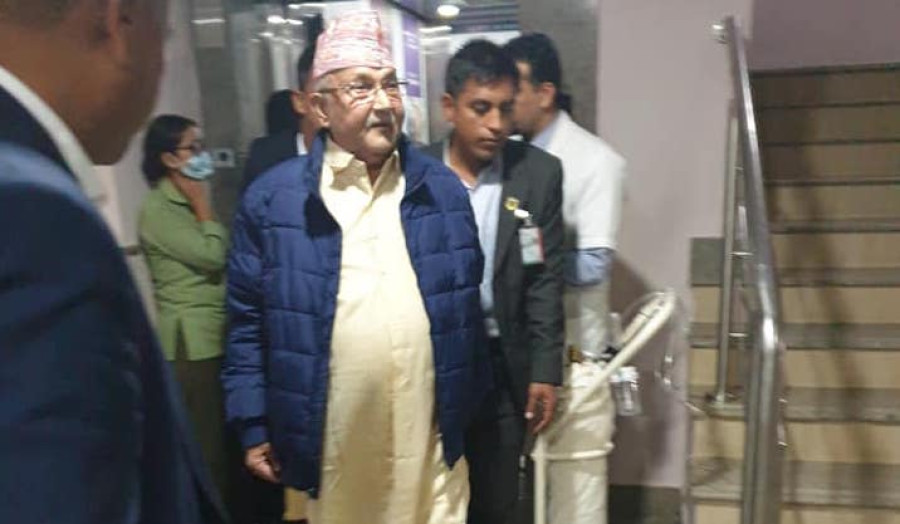Politics
Over murky details, Oli’s health raises questions about his fitness to govern
Doctors say all is not well with the 67-year-old prime minister and there are chances he has to undergo dialysis twice a week.
Anil Giri
Over the past 24 hours, there has been much speculation and conjecture about Prime Minister KP Sharma Oli’s health. Ever since Oli was admitted to Grande International Hospital on Wednesday morning, little information has been forthcoming from the government authorities.
But on Thursday, a medical doctor who has been monitoring Oli’s health told the Post that the prime minister had undergone a second procedure for urethral dilation on Wednesday due to difficulties in passing urine.
The doctor, who spoke on condition of anonymity because he wasn’t allowed to speak on prime minister’s health, also confirmed that Oli had undergone two rounds of dialysis during his stay at Grande, despite much speculation and a lack of information from officials and attending doctors.
On Wednesday evening, a brief statement issued by Dr Dibya Singh Shah, Oli’s personal physician, and Dr Chakra Raj Pandey, medical director at the Grande hospital, had described the prime minister’s health as “normal”.
“After all the required tests, [the prime minister] will be discharged tonight or tomorrow,” read the statement.
But on Thursday afternoon, Nepal Communist Party (NCP) leaders said that Oli had undergone dialysis, of which there was no indication or information either from the hospital or Oli’s physician. Later on Thursday, ruling party Co-chair Pushpa Kamal Dahal, after meeting with Oli at the hospital, also told the media that Oli had undergone dialysis.
“After his second dialysis, the prime minister is resting,” said Dahal.
Statements from Oli’s aides only added to the confusion. Kundan Aryal, Oli’s press adviser, said on Wednesday that the prime minister had been taken to the hospital for “a regular health check-up” despite reports that he had been admitted to the intensive care unit.
Finally, on Thursday evening, the hospital organised a press conference and Pandey, the hospital director, confirmed that Oli had undergone dialysis, but stopped short of divulging any more information. Pandey left it unclear whether Thursday’s dialysis was the first or second, as a section of the media, including the Post’s sister publication Kantipur, reported that Oli had undergone dialysis twice. Pandey refused to say how many times the prime minister had undergone dialysis in the last 24 hours and if there were high levels of creatinine, blood urea nitrogen and potassium in the prime minister’s blood and urine.
The number of times Oli underwent dialysis is important since the prime minister, now 67, is functioning with just one working kidney that was transplanted 12 years ago, in 2007, at India’s Apollo Hospital.
“If it is an acute problem, then two or three rounds of dialysis will be enough, but if it is chronic then he will have to go for three rounds of dialysis every week,” said Nepali Congress leader Shekhar Koirala, who is also a medical doctor.
This is not the first time Oli’s team has tried to drop a veil over his health condition and this tendency is a cause for concern, political commentators say.
“He is not just the prime minister of the country but at this time, he is the property of the country so it is the public’s right to know his health status,” Bhojraj Pokharel, former chief election commissioner, had told the Post in August after Oli’s first trip to Singapore for treatment. Then too, the government had closely guarded health reports and simply said that the prime minister had taken a “short break”.
Later that month, Oli left for Singapore again to undergo plasmapheresis, a process that filters the blood and removes antibodies, a necessary procedure for someone who has a transplanted organ. According to doctors, transplanted kidneys are always at risk of rejection by the host’s antibodies at any time.
This Wednesday, at Grande, doctors and officials remained tight-lipped but there was much speculation regarding the condition of Oli’s kidney. Pandey’s refusal to answer questions regarding creatinine, blood urea nitrogen and potassium levels has only created more confusion, as multiple media outlets alluded to increases in all these indicators.
Creatinine levels, according to doctors, provide a fair idea about how well one’s kidney is functioning. If creatinine level starts rising, doctors recommend an investigation to ascertain why.
What is more concerning, according to the doctor who spoke to the Post, is that the increase in creatinine could also indicate transplant rejection.
“Three rounds of dialysis after plasmapheresis within a span of two months is an indication of kidney rejection,” said the doctor.
According to doctors, blood urea nitrogen is usually removed by the kidneys, but when kidney function slows down, its level rises. Likewise, a rise in the level of potassium, which helps the heart and muscles to work properly, could be life-threatening.
If the assessment of multiple doctors the Post spoke with is anything to go by, Oli’s transplanted kidney may be facing rejection and that the prime minister will either require regular dialysis, which could be twice a week, or another transplant.
Oli was discharged from the hospital on Thursday night.




 9.83°C Kathmandu
9.83°C Kathmandu














